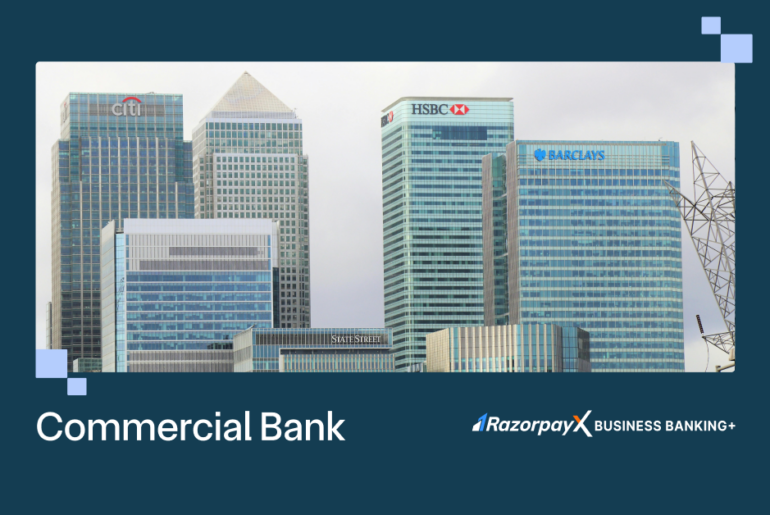Table of Contents
What are commercial banks?
Commercial banks are financial institutions that offer services like cash deposits, loans, locker facilities, and business finance functions like receivables and payables management, capital raising and more.
Commercial banks earn money by lending deposited money in the form of loans and charging interest. Some popular commercial banks in India include State Bank of India, HDFC Bank and Canara Bank.
Commercial banks typically serve businesses, large corporations and governments in addition to individual consumers. Retail banking or consumer banking is the more commonly known subset of commercial banking that serves the individual.
Functions of a commercial bank
Commercial banks serve several functions which are vital to the functioning of the economy. To list a few:
Accepting deposits
This is the primary function of a commercial bank. Individuals and banks can deposit money with a commercial bank. If the money is held in a savings bank or a fixed deposit account, account holders can earn a small interest on the money deposited. If it is being held in a current account, the money does not earn an interest.
Offering loans
Commercial banks don’t just let deposited money sit stagnant in their lockers. This money is lent out to borrowers in the form of home loans, vehicle loans, personal loans, etc. Banks charge a higher interest on these loans and repay part of this interest to the depositors as interest on their deposits. The remaining interest is retained by the bank itself as profit.
Commercial banks offer loans to individuals, businesses and even governments at times of need.
Facilitating payments
Payment infrastructure is largely set up and supported by commercial banks. Methods like electronic transfers, checks, and online banking are important to the smooth flow of trade and supply chains. For example, by offering payment methods like NEFT, RTGS, and UPI, commercial banks play a vital role in enabling cashless, real-time transactions that keep money moving efficiently within the economy.
Lockers and safekeeping
Commercial banks also offer locker services to the public and businesses to safeguard personal belongings, valuables or even hard cash. Account holders can rent out a locker space and can be assured that their belongings are being kept safely.
Investment services
Commercial banks offer investment products like mutual funds, bonds, options and futures for individual investors and corporations to invest in.
Corporate finance services
Commercial banks perform a variety of services for companies, including merger and acquisition handling, IPOs, capital raising, corporate credit cards and more.
Importance of commercial banks
It would not be an understatement to say that commercial banks keep the economy running. Here’s how:
Keeps cash flowing
By accepting deposits and lending money, commercial banks keep cash flowing in and out of the economy. Through commercial banks, the Reserve Bank of India (RBI) tightly regulates the rates of deposit and lending to control inflation and encourage growth.
Read more: Repo Rate
Boosts the economy
Commercial banks boost economic growth by providing loans and lines of credit to businesses and individuals, enabling investments, consumption, and expansion.
Loans for businesses support operations, new projects, and infrastructure development, while personal loans allow individuals to make large purchases, invest in homes, or start businesses. When people and businesses spend money, they drive demand, which contributes to the positive growth of the country’s GDP.
Facilitates trade
Commercial banks provide payment processing for within the country and beyond. Forex processing infrastructure is created by commercial banks, enabling people and businesses to make and receive payments from other countries, creating opportunities for economic collaboration and growth.
For example, banks like State Bank of India, HDFC and ICICI bank played pivotal roles in the creation and adoption of the UPI payments infrastructure, one of the most successful and popular modes of digital payments in the world.
Encourages savings and investment
With offerings like fixed deposit, recurring deposit, mutual funds and other investment options, commercial banks encourage the public to save money and invest in businesses. This creates financial stability and contributes to the growth of the economy, since even money held in fixed deposits is generally lent out to borrowers.
Examples of Commercial Banks in India
Some commercial banks in India include –
State Bank of India
SBI is the largest public sector bank in India, known for its extensive branch network and comprehensive banking services.
HDFC Bank
HDFC is one of India’s leading private sector banks and is known for its strong digital banking platform.
ICICI Bank
ICICI is one of the most popular banks in India, and offers a range of financial services, from personal and corporate banking to investment and insurance.
Axis Bank
Axis bank is popular for its retail and corporate banking services and innovative digital banking solutions.
Commercial Banking Solutions for Businesses
Commercial banks offer tailored solutions and services for businesses to manage their finances. These services include:
Cash management services
Commercial banks help businesses manage inflows and outflows of cash, along with collection, accounting and reconciliation tools. Today, some banks in India partner with software providers like RazorpayX to combine the agility of tech with the stability of banks – bringing solutions like RazorpayX Business Banking+, a full-stack business banking platform.
Working capital finance
Commercial banks provide businesses with operating finance in the form of overdrafts, corporate credit cards, and invoice discounting. Working capital finance provided by commercial banks is crucial for small and medium businesses (SMEs) as it ensures they have the liquidity needed to cover daily operating expenses.
Payables management
Another result of the partnership between fintechs and banks, payables management is an important business banking service that covers invoice management with the help of technology like OCR capture and automation, payables and receivables management, vendor management and more.
Check out RazorpayX Source to Pay for a comprehensive solution to all your payables needs!
Explore RazorpayX Source to Pay
FAQs
- What is the difference between commercial banks and investment banks?
Commercial banks serve simple banking functions like deposits, loans, etc. Investment banks serve a more complex purpose – facilitating M&As, IPOs, capital raising, etc for businesses and governments.
- What are the four types of commercial banks?
The four types of commercial banks in India are Public Sector Banks (PSBs), Private Sector Indian Banks, Private Sector Foreign Banks, and Regional Rural Banks (RRBs).
- Is RBI a commercial bank?
No, RBI is a central bank. The RBI is the central regulatory authority that controls the functioning of all banks in the country. Some examples of commercial banks are – SBI, HDFC, Axis, etc.




